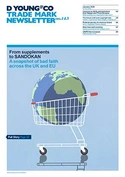The knowledge requirement for acquiescence: Court of Appeal guidance
The Court of Appeal has provided further guidance on the knowledge requirement for acquiescence in the UK, and in doing so has departed from retained EU law.
Brief background
Industrial Cleaning Equipment (Southampton) Ltd (ICE UK) has been using the ICE brand in relation to the sale and rental of cleaning machines in the UK for many years. Intelligent Cleaning Equipment Holdings Co Ltd, a British Virgin Islands company (ICE BVI), started importing small quantities of cleaning machines bearing the mark ICE into the UK in 2014. ICE UK became aware of some use of the ICE mark on the market in the UK by ICE BVI in July 2014.
ICE BVI filed international registrations for ICE in 2015. The international registrations were registered at the EUIPO in 2016. ICE UK was not aware of these registrations until July 2019, but filed its own UK trade mark in October 2015.
Despite several rounds of correspondence between the parties no resolution was reached, and a claim was issued on 24 May 2021 (just under five years after registration of ICE BVI’s international registration (EU) marks).
First instance
The judge found that ICE BVI’s trade marks were invalid on the basis of passing off, and that ICE BVI were infringing ICE UKs trade marks in the UK.
ICE UK had not acquiesced to ICE BVI’s marks, in particular because (following Budvar C-482/09) the five-year period for acquiescence only started running when ICE UK became aware of ICE BVI’s registrations, which was in July 2019.
Appeal
The two main points on appeal were:
- Does the owner of an earlier right need to know about the use and registration of later trade marks for the statutory acquiescence period to start running; and
- In the case of international registration (EU) marks, does the period of acquiescence run from the World Intellectual Property Organization (WIPO) registration date, or from the date of grant of protection at the European Union Intellectual Property Office (EUIPO).
In answer to the first question, the Court of Appeal held that knowledge of use of the registration is all that is required to start time running in relation to statutory acquiescence. In doing so, the Court of Appeal departed from CJEU case law, which was justified on the basis that:
- This point was not the dispositif (that is, the Court of Justice of the European Union’s (CJEU) formal answer to the question) in Budvar C-482/09, as knowledge of the registrations was not in issue.
- There is mixed judicial precedent on this point even in the EU. Cases such as Ghibli and the EUIPOs own guidelines, suggest knowledge of the registration is not required; and
- Departing from Budvar did not create issues in relation to legal certainty, as few trade mark proprietors would have based their commercial strategy on this point.
In answer to the second question, the Court of Appeal held that acquiescence in relation to EU international registrations runs either from acceptance of the registration by the EUIPO, or from publication of the statement of grant of protection by the EUIPO (the Court of Appeal did not need to decide which in this case as it did not make a difference to the outcome). Ultimately the appeal was dismissed.
Key lessons
- There is a new test for acquiescence in the UK. The owner of the earlier right only needs to be aware of the use of a registration, not the fact of it, for the five-year period to start running.
- This is perhaps not surprising following other recent cases (including Combe), in which there has been increasing emphasis on knowledge of use as being the critical factor in acquiescence. This raises the question of whether we will ultimately move towards a position of “constructive knowledge” in the UK, that is, in the future, will it be enough to say that the owner of the earlier right has acquiesced to a registration because they should have known that the same was being used?
- The five-year period for acquiescence starts from actual date of registration, which in the context of international registration (EU) marks is when registration is granted by the EUIPO.
- A separate, but helpful, point of clarification is that statutory acquiescence is also a bar to passing off claims.
Disclaimer: D Young & Co acted for the successful claimant/respondent Industrial Cleaning Equipment (Southampton) Limited (ICE UK) in this claim. This article is an academic summary of the case, not a statement on behalf of D Young & Co or ICE UK.
Case details at a glance
Jurisdiction: England & Wales
Decision level: Court of Appeal
Parties: Industrial Cleaning Equipment (Southampton) Limited and Intelligent Cleaning Equipment Holdings Co Ltd & Killis Limited
Citation: [2023] EWCA Civ 1451, [2023] WLR(D) 511
Date: 06 December 2023
Useful links
- [2023] EWHC 411 (IPEC): dycip.com/2023-ewhc-411ipec
- Budvar C-482/09 (Budějovický Budvar, národní podnik v Anheuser-Busch Inc): dycip.com/c‑482-09
- Ghibli (R 1299/2007-2 Cristanini v Ghibli SpA) EUIPO Trade Mark Guidelines, 4.5.3. Acquiescence: dycip.com/acquiescence-euipo-guidelines
- Combe [2022] EWCA Civ 1562, [2023] Bus LR 532, [2022] WLR(D) 477 (Combe International LLC and Combe International Limited v Dr August Wolff GMBH & CO KG Arzneimittel and Acdoco Limited): dycip.com/2022-ewca-civ1562

